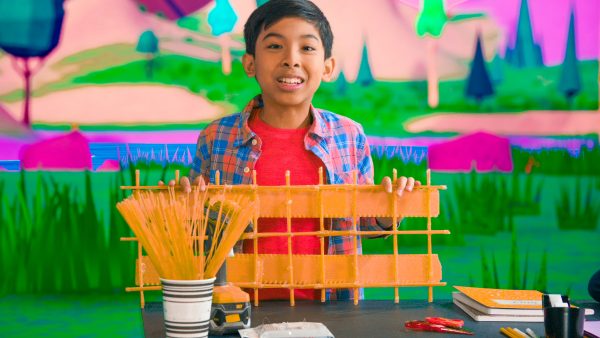Definition Of Engineering
Engineering uses science and math to creatively solve problems. For example, engineers design and test machines to improve how they work.
View Lesson on What is Engineering?
Become a member to get full access to our entire library of learning videos, reading material, quiz games, simple DIY activities & more.
Become a member to get full access to our entire library of learning videos, quiz games, & more.
Plans & Pricingto watch this full video.

Access All Videos
and Lessons, No Limits.
Access All Videos

No credit card required,
takes 7 sec to signup.
No card required

Ready-to-go lessons
that save you time.
Ready-to-go lessons
If you are on a school computer or network, ask your tech person to whitelist these URLs:
*.wistia.com, fast.wistia.com, fast.wistia.net, embedwistia-a.akamaihd.net
Sometimes a simple refresh solves this issue. If you need further help, contact us.
What is Engineering?
Fun Facts
- Failure is a big part of the engineering design process and a chance to improve.
- Constraints like time, materials, and cost are part of engineering.
- An example of engineering is designing a bridge.
Why Do We Need To Know About Definition Of Engineering
Studying engineering helps you see how math and science are used in the real world to solve big problems. Engineers work on projects that make our lives better, like new medical treatments and tech gadgets.
There are many types of engineering, and each one does something special. For example, electrical engineers work on electronics and robots, biomedical engineers make medicines that save lives, and aerospace engineers design spaceships. These engineers design, build, test, and make their projects better to help people.
Frequently Asked Questions
Check out the Full Lesson on What is Engineering?
In this lesson, we learn that:
- Engineers use science and math to solve problems.
- Engineers also build and test things.
- Each time they re-design it, the solution can get better.
Related Topics
- Balanced Force Definition
- Biotechnology Definition
- Cellular Respiration Definition
- Continental Drift Definition
- DNA Definition
- Definition Of Engineering
- Dichotomous Key Definition
- Earth’s Axis Definition
- Earth’s Rotation Definition
- Element Definition
- Engineer Definition
- Gas Definition
- Heat Definition
- Humidity Definition
- Light Year Definition
- Liquid Definition
- Magnetic Field Definition
- Magnetism Definition
- Marsupial Definition
- Metamorphosis Definition
- Mold Fossils Definition
- Mutation Definition
- Natural Disaster Definition
- Ocean Current Definition
- Parasitism Definition
- Plant Definition
- Plant Growth Definition
- Pollinator Definition
- Precipitation Definition
- Rain Gauge Definition
- Recycle Definition
- Renewable Resource Definition
- Reversible Change Definition
- Scientific Name Definition
- Seed Definition
- Seed Dispersal Definition
- Seeing Definition
- Soil Erosion Definition
- Sunlight Definition
- Thermal Energy Definition
- Trace Fossil Definition
- Translucent Definition
- Tsunami Definition
- Virus Definition
- Volts Definition
- Water Distribution Definition
- Weight Definition
- Wind Erosion Definition
Start a Free Trial Today. Get a $5 Amazon Gift Card!
Teachers! Start a free trial & we'll send your gift card within 1 day. Only cards left. Try it now.
Select Grade
Select Subject
This email is associated with a Science Kit subscription. Kit subscriptions are managed on this separate page: Manage Subscription

-
Download InvoiceScience & Math$/yr
-
Download InvoiceScience Only$/yr

access all lessons
• No credit card required •
"My students loved the videos. I started the video subscription in May and used them as a review before the state test, which I know contributed to 100% of my class passing the state test."
Rhonda Fox 4th Grade Teacher, Ocala, Florida
Use Generation Genius in Your School
Access all lessons free for 30 days.
"My students loved the videos. I started the video subscription in May and used them as a review before the state test, which I know contributed to 100% of my class passing the state test."
Rhonda Fox 4th Grade Teacher, Ocala, Florida
• No credit card required •
Already a member? Sign In
* no credit card required *

* no credit card required *
* no credit card required *


to Discover the Benefits of Generation Genius
Learn How to Save for Your School & District!

no credit card required
Skip, I will use a 3 day free trial
Enjoy your free 30 days trial
-
Unlimited access to our full library
of videos & lessons for grades K-5. -
You won’t be billed unless you keep your
account open past your 14-day free trial. -
You can cancel anytime in 1 click on the
manage account page or by emailing us.
-
Unlimited access to our full library of videos & lessons for grades K-5.
-
You won't be billed unless you keep your account open past 14 days.
-
You can cancel anytime in 1-click on the manage account page.
Cancel anytime in 1-click on the manage account page before the trial ends and you won't be charged.
Otherwise you will pay just $10 CAD/month for the service as long as your account is open.
Cancel anytime on the manage account page in 1-click and you won't be charged.
Otherwise you will pay $10 CAD/month for the service as long as your account is open.
We just sent you a confirmation email. Enjoy!
DoneWe use cookies to make your experience with this site better. By using this site you agree to our use of cookies. Click "Decline" to delete and block any non-essential cookies for this site on this specific property, device, and browser. Please read our privacy policy for more information on the cookies we use.Learn More
We use cookies to improve your experience. By using this site, you agree to our use of cookies. Click "Decline" to block non-essential cookies. See our privacy policy for details.Learn More




























































































































